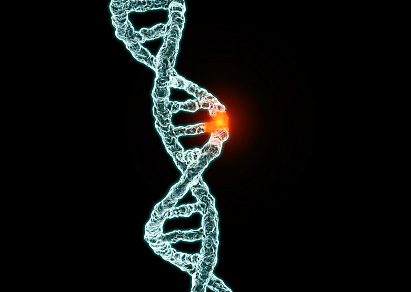

















ARVC is a genetically heterogeneous, autosomal dominantly inherited condition. Mutations in several difference genes are known to cause the condtion:
| gene | protein encoded |
|---|---|
| DSP | Desmoplakin |
| PKP2 | Plakophilin-2 |
| DSG2 | Desmoglein-2 |
| DSC2 | Desmocollin-2 |
| TMEM43 | Transmembrane protein 43 |
| JUP | Plakoglobin |
Approximately 50% of ARVC patients will have mutations in the DPS, PKP2, DSG2, DSC2, JUP or TMEM43 gene. Many cases of ARVC are due to mutations in unknown genes. Molecular testing for ARVC consists of complete sequencing of the coding region and flanking exon/intron boundaries of the many genes listed above to detect mutations.

ARVC is present when an individual has one copy of the defective DPS, PKP2, DSG2, DSC2, or TMEM43 gene. Some commercial laboratories also test the RyR2 gene. Affected individuals have a 50% chance of transmitting the disorder to each child. There is a 50% chance that the affected individuals offspring will not be affected with ARVC. Testing may demonstrate a pathogenic mutation, but often detects variants of unknown significance (VUS) and single nucleotide polymorphisms (SNPs) that can be challenging to interpret. An excellent updated database of genetic findings is found at the following link: www.arvcdatabase.info.
► Individuals clinically suspected of being affected by ARVC
► Individuals with a family history of ARVC, to determine carrier status
Complete sequencing of the coding region and flanking exon/intron boundaries of the DSP, PKP2, DSG2, DSC2 and TMEM43 genes to identify point mutations. More detail can be reviewed at the website of the Hospital for Sick Kids (Toronto): www.sickkids.ca